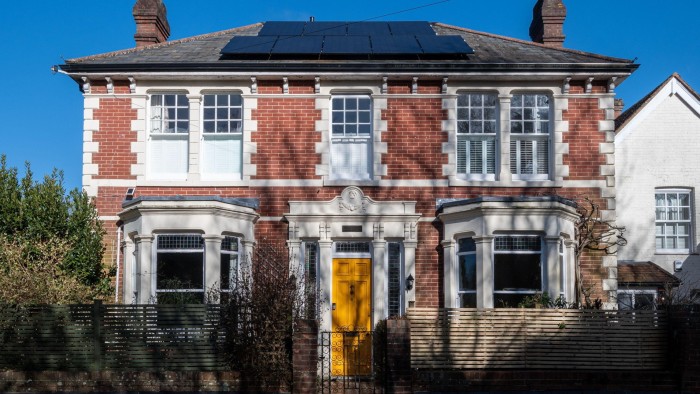Unlock the Editor’s Digest for free
Roula Khalaf, Editor of the FT, selects her favourite stories in this weekly newsletter.
This year I am hoping for two things: planning reforms that make it easier to retrofit the UK’s entire housing stock in order to upgrade national energy efficiency and the ability to add an extra solar panel to my own roof without the need for additional permission.
Both seemed reasonable wishes when Labour swept to power last summer promising a “green” energy revolution and the construction of 1.5mn new homes. But after some initial euphoria, the doubts are creeping in.
The problem lies with the country’s regime of opaque and over-prescriptive planning permissions.
This in turn stems from an understandable desire to maintain the appearance and fabric of mainly Georgian and Victorian buildings that make up the bulk of homes protected by listed or conservation area status.
For two and a half years, I have been campaigning in my north London neighbourhood of Islington to facilitate the sensitive installation of solar panels, insulation and heat pumps on such homes.
After my neighbours and I gathered 2,000 signatures from residents in favour of change, the local council promised to ease restrictions by the spring of 2024. Following repeated delays, a draft of the necessary supplementary planning document is now promised for January 6.
While I wait to hear whether Islington council will allow me to increase the number of solar panels approved for my roof, I look with envy at residents of the Royal Borough of Kensington and Chelsea.
Their council has pioneered the use of existing powers to issue local listed building consent orders that make it clear the conditions on which residents will receive approval for solar panels and such like.
Progress cannot rely solely on local initiatives like this one. A meeting this summer of officials from four different councils, including Islington and RBKC, called for an online database that would provide details on what residents are allowed to do to their homes and would update in real time. This would facilitate progress at national level. It would also enable local authorities to keep up with changes in technology so that rules are not already obsolete by the time the ink is dry.
At the moment, councils struggling with high staff churn and limited resources are left to produce their own rules, guides and plans in the absence of clear national guidelines. Lacking skilled staff, they hire temporary private consultants for urgent tasks. When the contracts expire, this expertise leaves the building.
Planning officers meanwhile have too much discretion to interpret existing rules that are costly for residents to navigate when they want to make their homes more sustainable.
This is holding up change. Buildings generate 25 per cent of UK greenhouse gas emissions. Without tackling those, the UK will fail to meet its legally binding target of net zero emissions by 2050.
Upgrading homes with solar panels, heat pumps and insulation would help to meet these targets and spur demand for green jobs and skills.
Government power is required. Chris Stark, a climate change expert, is co-ordinating the energy security and net zero department’s mission to develop “green” energy supply and deputy prime minister Angela Rayner is in charge of bulldozing obstacles to the construction of new homes. But there is no overarching strategy for retrofit.
Rayner’s revised “national planning policy framework” fast-tracks housebuilding, but does not direct councils to give more weight to sustainability when assessing applications for the retrofit of historic homes.
Setting up a national system for retrofit would require ambition and political will. But Ian Morrison, head of policy and evidence at Historic England, the quango in charge of preserving the country’s built heritage, says this is why government assistance is needed. “When you say something is too difficult, that’s the trigger for public sector intervention because the market alone isn’t going to fix it.”
Read the full article here

